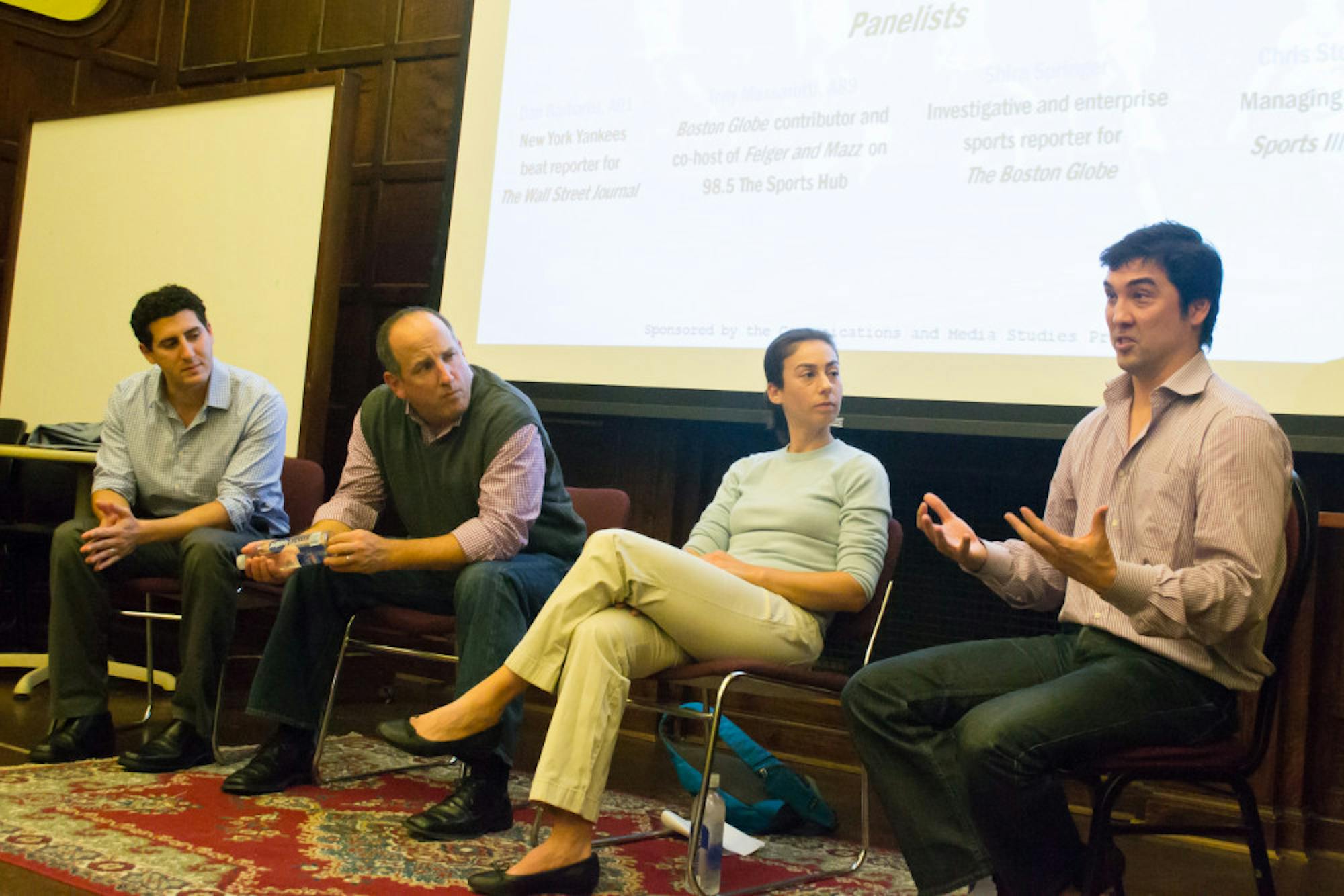“Nothing But Net: How Profits, Pundits and the Press are Changing Pro Sports,” took place yesterday night at 7:30 p.m. in the Crane Room. The panel covered major issues in professional sports including domestic violence, racism and gender inequality and how these issues interact with profits, media and the public. The event was sponsored by the Tufts Communications and Media Studies Program.
The panel included Chris Stone (LA ’92), managing editor for Sports Illustrated, Dan Barbarisi (LA ’01), New York Yankees beat reporter for The Wall Street Journal, Tony Massarotti (LA’ 89), Boston Globe contributor and co-host of a talk show on 98.5 The Sports Hub and Shira Springer, investigative and enterprise sports reporter for the Globe.
The discussion opened with a discussion of the flaws of the National Football League (NFL), focusing on its inability to handle major crises such as domestic violence and health issues of players.
According to Stone, the NFL simply waits for major problems or scandals to recede. However, they inevitably return and the cycle repeats itself.
“[The NFL] seems incapable … of handling issues that are really central, so when [Ray] Rice came along, they just got caught in a place where they were completely unprepared to handle it," he said. "They’re not proactive. For a league that is so protective of its image ... it’s incredible that they’re incapable of dealing with big picture issues.”
The NFL is able to continue this pattern of behavior because of the power it has from both revenues and fan support, Massarotti added. He noted that the NFL will not change how it acts until fans show their disapproval by refusing to watch the game -- this applies to the athletes in the league as well.
“If the public doesn’t really care, ultimately what are you asking of the athlete?" he asked. "Do you expect them to be model citizens, or do you just want them to be gladiators? Fans are more interested solely in the selfish return -- ‘can he play or not? If he can, then I don’t care what he does.’”
Springer said that one positive outcome of the Ray Rice scandal this year was the conversation it began on domestic violence, especially concerning women speaking out with the hashtags “#WhyIStayed" and "#WhyILeft” on Twitter, which prompted a discussion of domestic violence on ESPN.
“It is one good thing about sports, I would argue, that through sports we can actually have national, broad discussions about topics that we otherwise really wouldn’t discuss," Stone said. "Whether it’s domestic violence or brain trauma or other things ... What other forum could create such a broad discussion?”
The panelists then spoke on the topic of women’s sports, how they are portrayed in the media and how they are perceived by the public.
“[People say] women’s sports aren’t as entertaining, it’s not as exciting, the women aren’t as fast, the women aren’t as athletic as men, and I just call bullshit on that,” Springer said. “They are victims of poor marketing and poor marketing plans. I think they’ve always seen their audience as young girls, and they’re going to grow these young girls into fans when they grow up. But here’s the thing ... young girls can’t drive to games, they don’t have disposable income.”
In addition, female athletes are marketed as role models instead of great athletes, which makes them less interesting, Springer noted. Women’s teams must also compete against more popular and better funded men’s teams within their cities that have decades-long head starts. Springer proposed that professional men’s teams align with professional women’s teams to aid them with funding and marketing to close the disparity between the two.
The panelists then moved to a discussion on the media’s role in professional sports. Barbarisi explained how new social media outlets have changed how writers’ content is perceived.
“There was a while where what you write in the paper was different from what you were tweeting," he said. "It’s maybe a little less regimented, a little more personal, but that’s all gone now. You know, if you’re a producer of content, you’re a producer of content of any form.”
The four panelists ended the discussion with optimism for sports journalism in general.
“Sports writing is better now than it’s ever been -- there’s more writing being done and less taboo on topics,” Barbarisi said.






